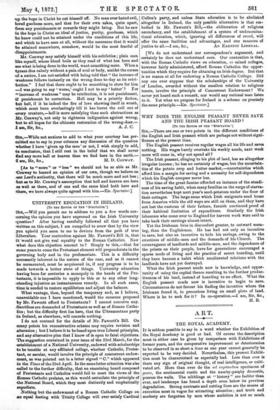UNIVERSITY EDUCATION IN IRELAND.
(To THE EDITOR OF THE "SPECTATOR."] 'SLR,—Will you permit me to address to you a few words con- cerning the opinion you have expressed on the Irish University question? After having carefully followed all that you have 'written on this subject, I am compelled to avow that by the view you uphold you seem to me to deviate from the path of true 'Liberalism. Your contention against Mr. Fawcett's Bill is, that it would not give real equality to the Roman Catholics. Now what does this objection amount to ? Simply to this,—that for some years to come the Protestant element will preponderate in the governing body and in the professoriate. This is a difficulty necessarily inherent in the nature of the case, and as it cannot be surmounted, must be acquiesced in, if any progress is to be made towards a better state of things. University education having been for centuries a monopoly in the hands of the Pro- testants, it is impossible to apply to this or to any other long- =standing injustice an instantaneous remedy. In all such cases, time is needed to restore equilibrium and adjust the balance.
What vantage, then, beyond the temporary and, as I believe, (unavoidable one I have mentioned, would the measure proposed by Mr. Fawcett afford to Protestants ? I cannot conceive any. Sacrifices are demanded of Protestants as well as of Roman Catho- lics; but the difficulty first lies here, that the Ultramontane party tin Ireland, as elsewhere, will concede nothing.
I do not contend for the details of Mr. Fawcett's Bill. On enany points his reconstructive scheme may require revision and -alteration ; but I believe it to be based upon true Liberal principles, and any alternative plan that I know of is open to fatal objections. The suggestion contained in your issue of the 23rd March, for the -establishment of a National University, endowed with scholarships to be tenable at any affiliated college, whether Catholic, Protes- tant, or secular, would involve the principle of concurrent endow- ment, as was pointed out in a letter signed " C." which appeared in the Times of the 23rd April. In the same letter attention was also called to the further difficulty, that an examining board composed of Protestants and Catholics would fail to meet the views of the Roman Catholic prelates, as this would assimilate the principle of the National Board, which they most distinctly and emphatically repudiate.
Nothing but the endowment of a Roman Catholic College on -an equal footing with Trinity College will ever satisfy Cardinal Cullen's party, and unless State education is to be abolished altogether in Ireland, the only possible alternative is that em- bodied in Mr. Fawcett's Bill,—the obliteration of religious ascendancy, and the establishment of a system of undenomina- tional education, which, ignoring all differences of creed, will offer the same facilities and advantages, and one measure of
[We do not understand our correspondent's argument, and certainly he does not understand ours. Our contention is that, with the Roman Catholic views on education, no mixed colleges, however fairly administered, afford Roman Catholics the oppor- tunities which they require for obtaining an Irish degree. But that is no reason at all for endowing a Roman Catholic College. Did any one ever suppose that the scholarships of the University of London, awarded without the smallest relation to religious tenets, involve the principle of Concurrent Endowment ? We never yet heard such a remark, nor would any rational man listen to it. Yet what we propose for Ireland is a scheme on precisely the same principle.—En. Spectator.]


































 Previous page
Previous page